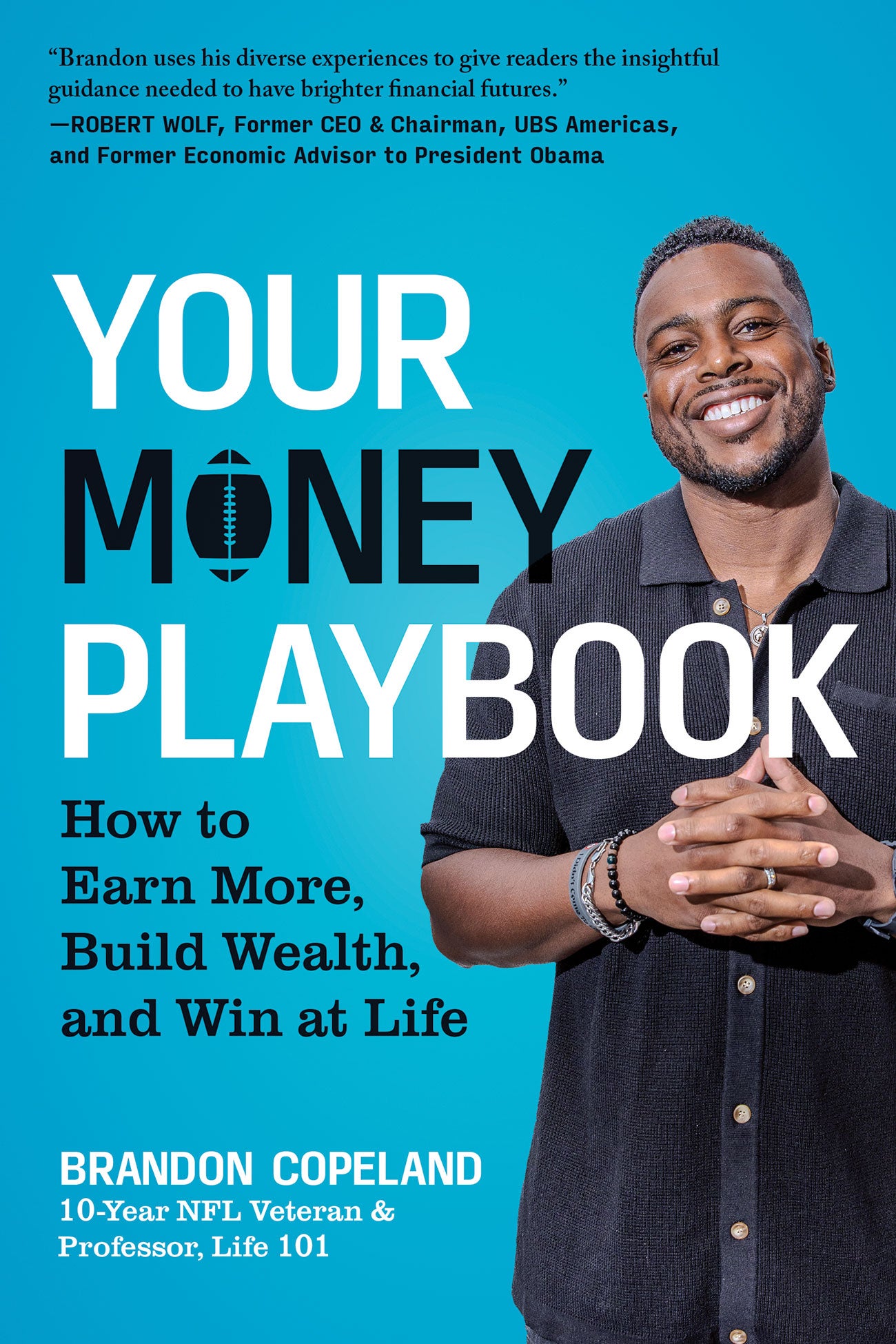
From the bright lights of the NFL to the halls of the Ivy League, Brandon Copeland has always been one to defy expectations.
As a former linebacker who spent over a decade playing in the NFL, Copeland is now tackling a different kind of challenge: teaching financial literacy. With his new book, Your Money Playbook: How to Earn More, Build Wealth, and Win at Life, Copeland aims to share his expertise on financial empowerment with everyday people, and especially with Black communities, where financial education is often out of reach.
Born in Baltimore, MD, Copeland’s journey from the football field to the classroom started early. The grandson of an NFL player who also juggled multiple jobs, Copeland grew up seeing first-hand the importance of financial stability beyond professional sports. He shares, “With all of those different perspectives, it made me go into the league and think, “I got to use this as much as it’s going to use me.”
He continues, “I learned a lot about money in the league, and I realized there’s a lot of people who will never be able to walk into a Baltimore Ravens locker room or a Detroit Lions locker room and get access to these types of people and conversations, so what can I do to make sure that a younger version of me doesn’t have to be elite, athletically, to get information that you deserve to have.”

But what sets Copeland apart isn’t just his NFL career or his time as a professor at the University of Pennsylvania — it’s his dedication to democratizing access to financial information, a mission that has earned him a place on the Forbes 30 Under 30 list and the NFLPA’s Alan Page Community Service Award.
Now, with the release of Your Money Playbook, Copeland brings his holistic approach to financial freedom to the masses, empowering readers with practical steps to manage their money, invest wisely, and plan for the future. His work comes at a critical time, particularly for Black Americans who, according to a 2021 McKinsey report, hold just 1.5% of the nation’s wealth despite comprising 13% of the population.
Copeland’s transition from professional athlete to financial educator wasn’t an afterthought. Early in his career, he realized that many athletes, especially Black athletes, often leave the game financially unprepared for what comes next. His key to staying disciplined with money? “It was to act like I didn’t have it,” he shares. “Literally, I don’t count a dollar until it hits my bank account.”
During his NFL career, Copeland saved and invested most of his earnings. His disciplined approach wasn’t just about hoarding wealth — it was about creating a stable future. “So many of us, especially in the Black community, don’t know the right questions to ask when it comes to our finances. I knew I had to do something to change that.”
Financial literacy is a subject Copeland is passionate about, and it’s something he sees as an urgent need within Black communities. As a professor at Penn, Copeland teaches “Life 101,” a course that covers everything from managing a 401(k) to budgeting and investing, helping students build the financial foundation they’ll need throughout their lives. His book builds on this work, offering practical advice for anyone looking to gain control over their money and, ultimately, their future.
“If you have a dollar to your name, you are an investor,” he says. “What I mean when I say that, if I have a dollar and I choose to put it under my mattress, it’s a 0% return. If I choose to put it in a regular credit union checking account, it might be 0.01% return. If I put it in a high yield savings account, 4-5% return. I put it in the stock market index fund, S&P 500 or something like that, I’m looking at a 9-10% return, annually. Real estate gives you something different. But long story short, if you have a dollar, by investing it, you’ll create some type of return on your money.
According to a 2022 report by the Federal Reserve, the median wealth of white households is more than five times that of Black households. This gap is fueled by systemic inequities in income, home ownership, and education — but Copeland believes that access to financial education can begin to close it.
“The biggest issue is that financial literacy isn’t taught early enough in our communities,” he explains. “We know how to hustle, but we aren’t taught how to make that money work for us over time.” He stresses that financial independence isn’t about cutting back on all of life’s joys, but about smartly navigating opportunities for growth.
His philosophy of “monetizing passions” shines through in both his teaching and personal life. From launching Life 101 to making real estate investments, Copeland has mastered the art of turning hobbies and side hustles into multiple income streams. “I try to double click on the things that I’m already spending my time doing and put the things that I enjoy under a microscope and see how can I lean more into those,” he says. “Because if you’re able to monetize the things you enjoy, then you can spend less time doing the things you don’t enjoy.”
This approach reflects a broader trend among Black entrepreneurs, with the National Bureau of Economic Research reporting a surge in Black business creation, which grew by 38% during the pandemic.
Despite these gains, Black Americans still face considerable challenges when it comes to building wealth. According to the U.S. Census Bureau, 35% of Black households live in asset poverty, meaning they don’t have enough net worth to survive at the poverty level for three months without income. Copeland is committed to tackling these disparities head-on by equipping his readers with the tools and strategies they need to get ahead.
One of the key messages in Your Money Playbook is understanding that everyone is an investor, regardless of income level. “Whether you have one dollar or one million, you’re making decisions about what to do with your money every day,” Copeland says. He encourages readers to shift their mindset from one of fear to one of growth, investing in ways that will pay off in the long run, rather than chasing quick wins.
For Copeland, this approach also includes estate planning — an often overlooked but critical element in Black communities. As he points out, high-profile cases like the passing of Chadwick Boseman, who didn’t have a will, highlight the need for more conversations around legacy building. Without proper planning, the wealth created can be eroded through taxes and legal disputes. “We have to be intentional about the legacy we leave behind,” he says, a message that resonates deeply within communities where wealth transfer has historically been an uphill battle.
While Your Money Playbook is filled with financial tips, its most profound message is about achieving balance. Copeland sees financial freedom as part of a broader pursuit of mental and emotional well-being. “Money can either be a source of stress or a tool for freedom,” he explains. His goal is to help people feel empowered by their financial decisions rather than overwhelmed by them.
Research shows that financial stress disproportionately affects Black Americans. A Pew Research Center survey found that 54% of Black adults worry about paying their bills, compared to just 39% of their white counterparts. This financial anxiety can take a toll on mental health and Copeland’s holistic approach is designed to help alleviate that. “If you don’t invest, you’ll always have to work to earn. You’ve got to find some point in time where you can do that.” His advice is practical, urging people to prioritize both earning and saving, but to never lose sight of living fully in the present.
Brandon Copeland is not just another former athlete trying to capitalize on his fame. He’s a man on a mission to uplift his community by breaking down the barriers to financial knowledge. Your Money Playbook is more than just a guide to wealth; it’s a manifesto for creating lasting change.
“I’ve been in the spotlight, and there are so many folks who you are literally spending money just to impress… Nah, I’m not going to waste my money trying to put bottles up in the club just so that you can see that,” Copeland says, emphasizing the importance of prioritizing long-term financial goals over short-term impressiveness.
Through his book, his teaching, and his advocacy, Copeland is laying the groundwork for a future where financial literacy is the rule, not the exception, for Black Americans.
